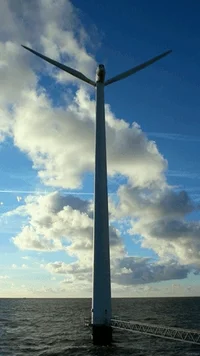Lawmakers
propose tax credits to spur offshore wind energy
 Senator Sheldon Whitehouse (D-RI), Congressman Jim Langevin (D-RI), and
Senator Edward J. Markey (D-MA) reintroduced legislation today that would spur
the growth of offshore wind energy in the United States by extending tax
credits for the renewable energy industry.
Senator Sheldon Whitehouse (D-RI), Congressman Jim Langevin (D-RI), and
Senator Edward J. Markey (D-MA) reintroduced legislation today that would spur
the growth of offshore wind energy in the United States by extending tax
credits for the renewable energy industry. The Offshore Wind Incentives for New Development (WIND) Act would extend the 30 percent Investment Tax Credit (ITC) for offshore wind through 2025.
The Energy Department found that the United States could install a total of 22,000 megawatts of offshore wind projects by 2030 and 86,000 MW by 2050, creating tens of thousands of jobs in coastal communities along the Atlantic Coast.
The nation’s first offshore wind project at Block Island, Rhode Island began operations in December 2016 after being initiated nearly nine years ago and is now producing enough power each year to power 17,000 homes. The Block Island wind farm will lower carbon dioxide emissions by 40,000 tons each year, or the equivalent of taking 150,000 cars off the road over the next 20 years.
The Vineyard Wind farm, the first project planned for federal waters off the coast of Massachusetts, will generate clean, renewable, cost-competitive energy for over 400,000 homes and businesses across the Commonwealth, while reducing carbon emissions by over 1.6 million tons per year.
Massachusetts has set a goal of procuring 1600 MW of offshore wind under a 2016 renewable energy law, and the Massachusetts Department of Energy Resources recently laid out a plan to solicit an additional 1,600 MW of offshore wind by 2024.
“As
the home of the nation’s first offshore wind farm, the Ocean State has become a
hub of the growing offshore wind industry,” said Whitehouse. “Our bill
will extend a key tax credit to support offshore wind developments in Rhode
Island and across the country that will grow the green energy economy by
following the Block Island Wind Farm’s example.”
“Rhode
Island has already demonstrated that offshore wind is a vital part of America’s
renewable energy future given the success of the Block Island Wind Farm,” said
Langevin, who serves as Energy Task Force Chair on the Sustainable Energy and
Environment Coalition in Congress. “This legislation will help spur further
offshore wind energy development and provide more certainty for companies in
Rhode Island that are part of this growing industry.”
“Offshore
wind has the potential to change the game on climate change, and those winds of
change are blowing off the shores of Massachusetts,” said Markey. “Offshore
wind projects are a crucial part of America’s clean energy future, creating
tens of thousands of jobs up and down the East Coast and reducing carbon
pollution. In order to harness this potential, we need to provide this
burgeoning industry the long-term certainty in the tax code that it needs.”
A
copy of the Offshore WIND Act can be found here.
Other
Senators co-sponsoring the legislation include Senators Jack Reed (D-R.I.), Elizabeth
Warren (D-Mass.), and Cory Booker (D-N.J.).
“Without
Congressional action, the federal Investment Tax Credit for offshore wind is
set to phase out this year—just as the first wave of large-scale offshore wind
projects prepare to begin construction,” said Tom Kiernan, CEO, American Wind
Energy Association (AWEA).
“At this critical moment for a new U.S. energy industry, policy stability is more important than ever. We appreciate and strongly support proposals that would extend the Investment Tax Credit for offshore wind, jumpstarting the projected $70 billion build-out of America's offshore wind infrastructure, delivering large amounts of reliable, homegrown clean energy and tens of thousands of jobs to the U.S. economy.”
“At this critical moment for a new U.S. energy industry, policy stability is more important than ever. We appreciate and strongly support proposals that would extend the Investment Tax Credit for offshore wind, jumpstarting the projected $70 billion build-out of America's offshore wind infrastructure, delivering large amounts of reliable, homegrown clean energy and tens of thousands of jobs to the U.S. economy.”
Other
groups supporting the legislation include Sierra Club, Union of Concerned
Scientists, Mass Audubon, Natural Resources Defense Council, Oceana, and AWEA.